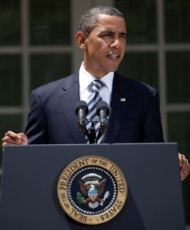After bringing the nation to the brink of default, Congress will reset and the real confrontation over the nation’s deficit will begin. In reality, the battle won’t be about the deficit, it will be about competing ideas about the role of the federal government. During round one of the debate, culminating in yesterday’s vote in the Senate and President Obama signing the deficit reduction package, conservative Republicans in the House, Tea Party stalwarts, successfully defined the conversation as the need to make deep spending cuts. Democrats,  particularly those in the “progressive” wing of the party, pushed for raising taxes on high income earners, while begrudgingly accepting cuts in entitlement programs. Round one went to conservatives but the true test will come in round two, as both parties gear up for the 2012 election cycle and will use the campaign to make their case with the public.
particularly those in the “progressive” wing of the party, pushed for raising taxes on high income earners, while begrudgingly accepting cuts in entitlement programs. Round one went to conservatives but the true test will come in round two, as both parties gear up for the 2012 election cycle and will use the campaign to make their case with the public.
Upon the Senate’s passing the deficit reduction legislation, President Obama appeared at the White House and made clear his intention to reframe the debate on the nation’s debt. The President insisted that any future action must incorporate revenue enhancements, including increasing the tax rate for high-income Americans. Sounding relieved that the nation had avoided default, but defiant in reaction to the direction negotiations took over the last week, President Obama said, “And since you can’t close the deficit with just spending cuts, we’ll need a balanced approach where everything is on the table. Yes, that means making some adjustments to protect health care programs like Medicare so they’re there for future generations. It also means reforming our tax code so that the wealthiest Americans and biggest corporations pay their fair share. And it means getting rid of taxpayer subsidies to oil and gas companies, and tax loopholes that help billionaires pay a lower tax rate than teachers and nurses.” The President’s tone is likely to please some Democrats, including party members on the Hill, who were angry over what they perceived to be the White House’s surrender to Tea Party Republicans on spending cuts and the exclusion of tax hikes on the wealthy in the final emergency legislation.
What the President and Democrats are pinning their hopes on is a provision in the emergency legislation that creates a bipartisan, two-house, 12 member congressional committee that must enact an additional $1.5 trillion in additional reductions by the end of the year. Any recommendation by this “Super Committee” must be fast-tracked in the House and Senate with the intent of preventing procedural maneuvers to block legislation from being voted upon. The committee must consider all options, including tax revenue and cuts to entitlement programs. If the committee does not come up with a plan, its failure will trigger $1.2 trillion in cuts in key areas such as Medicare and Defense. The President, who came out on the losing end after an intense public showdown with House Republicans during round one, is also likely buoyed by public opinion polls that indicate most Americans share his view that tax revenue must be a part of any long-term plan to reduce the deficit. The irony of the bickering over the last week is that Republicans characterized tax increases as a “jobs killer,” but the tax cuts enacted under the administration of President George W. Bush helped fuel the increase of the deficit and did not stimulate job growth.
What the last week’s debate on the deficit revealed was the fissure between the two major parties over the proper role of the federal government. At times it was difficult to keep score, as Democrats and Republicans, and factions within each party, were furiously spinning their points of view. Democrats were expressing anger towards what they viewed as the President’s conciliatory approach to conservative House Republicans, while the Tea Party was making life uncomfortable for Republican House Speaker John Boehner, pushing him farther right, to an ideological position he likely knew would make reaching a compromise difficult. The Speaker also had to deal with House Budget Committee chairman Rep. Paul Ryan, who seemingly competed with Boehner to be the authentic voice of the Republican Caucus. A generational chasm also opened as Republican House freshmen openly challenged party elders such as Senator John McCain, the 2008 GOP presidential candidate who publicly rebuked Tea Party loyalists in the House for being obstructionists. As the dust settles, both parties have some damage control to do and must begin repairing their public images.
Yesterday’s Senate vote was down to the wire, with the nation only hours from a historic default. Doomsday warnings from the Treasury Secretary Timothy Geithner and Wall Street analysts lent a sense of urgency and desperation to votes cast in the House and Senate over the last 48 hours. Facing the possibility of a downgrade in the nation’s triple-A credit rating, the maintenance of its credit worthiness was confirmed by credit rating agencies shortly after the legislation was signed by the President, just ten hours before the default deadline. The financial markets were not so kind, with the Dow Jones tumbling 200 points and losing ground for the eighth consecutive day. The drama was heightened on the floor of the House with a surprise appearance by Arizona Rep. Gabriel Giffords, still recovering from a horrific shooting months ago. Her presence tamed the partisan rancor, if just for a moment, as her colleagues in the House of Representatives warmly welcomed her with sustained applause as she cast her vote in favor of the deficit deal.
Photo courtesy of the White House






















